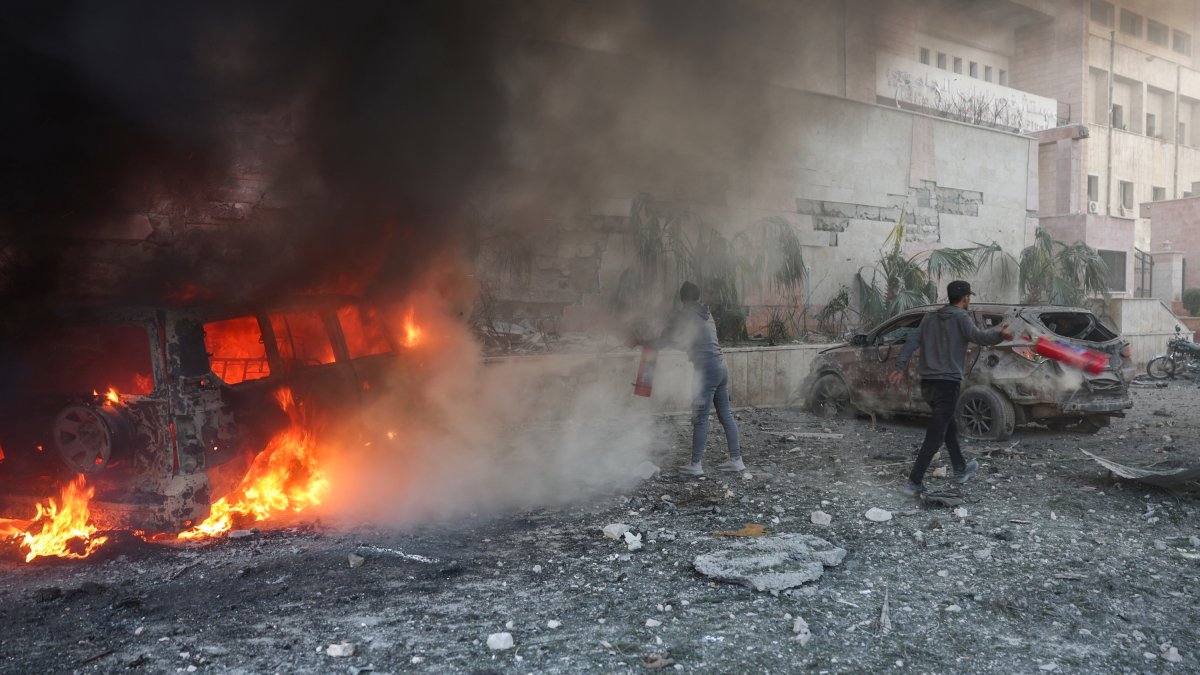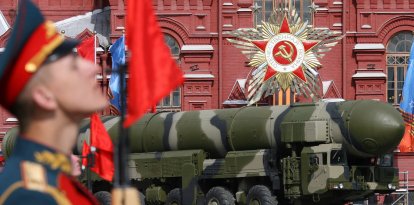Syria: Jihadists advance, al-Assad strikes back with Russia and Iran, and the West calls to reduce tensions
Following the surprise attack by jihadist rebels, the Assad regime is seeking to regain control of Aleppo and other areas. The fighting has left more than 500 dead. The United States, the United Kingdom, France and Germany have expressed concern about the situation.

Bombing in the jihadist rebel-held city of Idlib.
Last week, jihadist rebel forces in Syria led by the al-Qaeda-affiliated Hayat Tahrir al-Sham and Ahrar al-Sham, a coalition of several extremist Islamist groups, launched a combined attack in the north of the Arab country.
The focus of the fighting is in the cities of Aleppo (recently captured by the jihadists), Idlib and Hama, and rebel forces are advancing south towards the city of Homs. Jihadist attacks have also been reported in southern Syria, targeting positions and bases of Syrian President Bashar al-Assad's army, mainly in the areas of Daraa and Suweida.
Dr. Yehuda Balanga, a specialist on Syria and Hezbollah at Bar-Ilan University in Israel, indicated in an analysis published in the Israeli newspaper Israel Hayom that all indications are that the rebels are trying to take advantage of the blow that the Jewish state inflicted in Lebanon on the axis of resistance (Iran, Syria and Hezbollah) with the aim of making territorial gains and perhaps upsetting the balance of power in Syria.
Hadi al-Bahra, chairman of the Syrian National Coalition, a Western-recognized opposition political body, told Reuters from his office in Istanbul, Turkey, that the rebels began preparing for the capture of Aleppo a year ago, but the attack was delayed due to the war in the Gaza Strip. According to al-Bahra, the ceasefire between Israel and Lebanon gave them a new opportunity to launch the attack.
The Syrian opposition leader noted that the jihadists delayed the attack because they believed that "it would not look good" to fight Syria while there was a war going on in Lebanon, so they considered the ceasefire between Hezbollah and Israel a good opportunity to act.
The rebels quickly took the city of Aleppo and parts of the Idlib district. According to al-Bahra, the success was also due to the fact that Hezbollah and pro-Iranian militias were focused on the Israeli issue and assisting Lebanon after the ceasefire.
Balanga added that these attacks are likely supported by Turkey, a feuding neighbor, which in January 2018 invaded Syria during Operation Olive Branch with the aim of driving the Kurdish separatists out of the region and established a buffer zone on the Turkish-Syrian border near the last rebel stronghold in Syria: the Idlib province.
The objective of the rebel jihadists
The Israeli specialist explained that besides sharing the common goal of overthrowing the regime of Bashar al-Assad, the rebels do not have a unified agenda. He added that this is precisely the main weakness of the rebel camp, characterized by political and religious divisions. In fact, he noted, during the 13 years of civil war in Syria, they have never functioned as a cohesive body presenting a legitimate and structured agenda for all opponents of the Syrian regime, a situation similar to the current one.
Balanga argued that what is surprising in the rebel camp is that the Free Syrian Army, which represents the nationalist and secular wing in the war, supports the jihadists.
It should be noted that the Free Syrian Army acts as the military wing of the Syrian National Coalition.
Can the al-Assad regime fall?
Despite these attacks, Balanga indicated that the Syrian regime is not in immediate danger. And he recalled that even in al-Assad's most difficult years, when about two-thirds of the country was in the hands of different rebel groups, including the Islamic State terrorist organization, the regime did not collapse.
The Israeli expert explained that the Syrian regime was able to resist thanks to the breakup of opposition groups and the support of Russia, Iran and the terrorist group Hezbollah. In addition, the regime's control over the area from Damascus in the south to the coastal strip in the north was decisive for its military success, as the majority of the Syrian population resides in these areas.
Balanga called the jihadist attack a risky gamble to overthrow the Alawite regime, the branch of Shiite Islam to which al-Assad belongs, whose followers the Sunni jihadists consider infidels.
Russian and Iranian assistance to the Syrian regime
Balanga further argued that given the strategic importance that Iran and Russia attribute to Al-Assad's leadership in Syria, it is reasonable to assume that, before long, they will coordinate their forces to counterattack, regain lost territories and eradicate the last pockets of the rebellion for good.
More than 500 dead
Since the start of the surprise attack last week, more than 500 people have been killed, including nearly 100 civilians. Throughout the day, Syrian and Russian aircraft continued to bomb rebel targets in Idlib and Aleppo. Forces reportedly attacked a camp for displaced civilians, killing seven people.
The Syrian Observatory for Human Rights, a U.K.-based opposition organization that monitors the war in Syria, reported that rebels attacked the city of Hama, located in the eponymous province near Idlib and Aleppo. Six civilians were reportedly killed in rebel shelling in that area, which remains under regime control.
More reinforcements for al-Assad
Reuters previously reported that some 300 fighters from pro-Iranian militias crossed overnight last Sunday across the border from Iraq into Syria, aiming to help al-Assad regain control of Aleppo. The fighters belong to the Iraqi Hezbollah brigades and the Liwa Fatemiyoun organization, both under the umbrella of the pro-Iranian militias in Iraq, known as the Popular Mobilization Forces.
US, UK, Germany and France call for de-escalation of violence
Regarding the situation in Syria, the United States, the United Kingdom, France and Germany have issued a joint statement calling for de-escalation of violence, protection of civilians, avoidance of further displacement and no disruption of humanitarian access.
Chinese officials said they support Syria's efforts to maintain "security" and "stability" in the country.

























